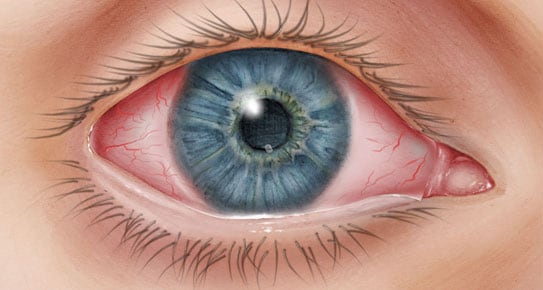Key points
- Conjunctivitis (pink eye) is one of the most common and treatable eye conditions.
- The most common causes of pink eye are viruses, bacteria, and allergens.
- Viral and bacterial pink eye are very contagious.

What it is
People often call conjunctivitis "pink eye" because it can cause the white of the eye to turn pink or red. Symptoms of pink eye can vary but typically include redness or swelling of the white of the eye or inner eyelid. The swelling makes blood vessels more visible.
Signs and symptoms
Some common symptoms in one or both eyes include:
- Pink or red color in the white of the eye
- Swelling of the eyelids or thin layer that lines the white of the eye
- Watery, teary eyes
- Feeling like something is in the eye or an urge to rub the eye
- Itchiness, irritation, and burning of the eye
- Discharge (pus or mucus)
Other symptoms may occur. Some symptoms vary depending on the cause.
Who is at risk
Anyone can get pink eye. However, newborns with symptoms of pink eye should be seen by a doctor right away.
Neonatal conjunctivitis (pink eye in newborns) is a red or watery eye condition in a newborn caused by infection, irritation, or a blocked tear duct. When caused by an infection, neonatal conjunctivitis can be very serious.
Causes
The most common causes of pink eye include:
- Viruses
- Bacteria
- Allergens
Other causes include chemicals, contact lens wear, and foreign bodies in the eye like a loose eyelash.
Prevention
Viral and bacterial pink eye are very contagious. They can spread easily from person to person.
You can prevent getting pink eye or spreading it to someone else by following some simple steps for good hygiene.
Vaccines can prevent some infections connected to pink eye.
Treatment and recovery
Treatment options for pink eye can depend what is causing it. Some types of pink eye can be managed at home without medical treatment. However, there are times when you should seek medical care.
When to return to school or work
If you don't have fever or other symptoms, you may be allowed to return with your doctor's approval. You should not attend if you still have symptoms, and if your work or school activities involve close contact with others.
